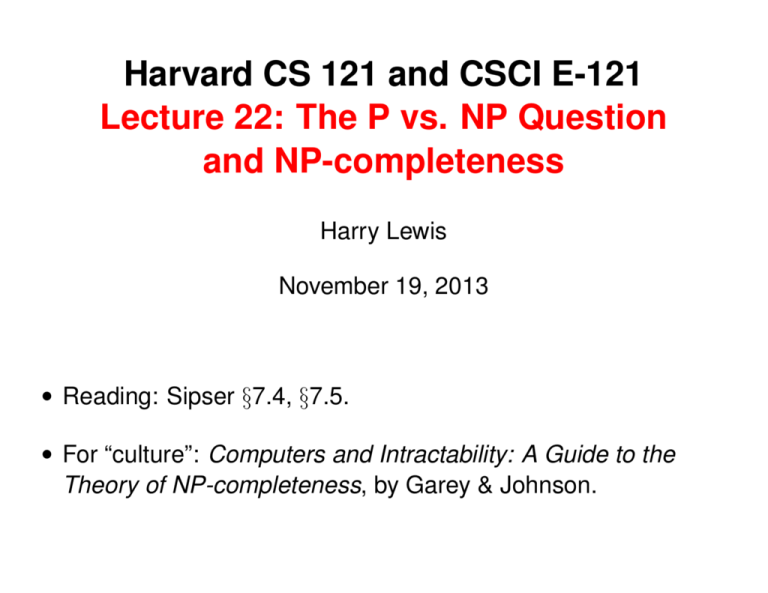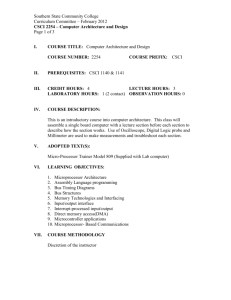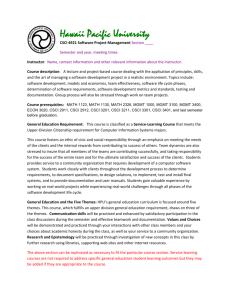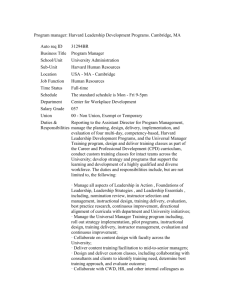NP-Completeness
advertisement

Harvard CS 121 and CSCI E-121
Lecture 22: The P vs. NP Question
and NP-completeness
Harry Lewis
November 19, 2013
• Reading: Sipser §7.4, §7.5.
• For “culture”: Computers and Intractability: A Guide to the
Theory of NP-completeness, by Garey & Johnson.
Harvard CS 121 & CSCI E-121
November 19, 2013
Composite Numbers
• C OMPOSITES = {w : w a composite number in binary }.
C OMPOSITES ∈ NP
Not obviously in P, since an exhaustive search for factors
can take time proportional to the value of w, which grows as
2n = exponential in the size of w.
Only in 2002 was it shown that C OMPOSITES ∈ P
(equivalently, P RIMES ∈ P).
1
Harvard CS 121 & CSCI E-121
November 19, 2013
Boolean logic
Boolean formulas
Def: A Boolean formula (B.F.) is either:
· a “Boolean variable” x, y, z, . . .
· (α ∨ β) where α, β are B.F.’s.
· (α ∧ β) where α, β are B.F.’s.
· ¬α where α is a B.F.
e.g. (x ∨ y ∨ z) ∧ (¬x ∨ ¬y ∨ ¬z)
[Omitting redundant parentheses]
2
Harvard CS 121 & CSCI E-121
November 19, 2013
Boolean satisfiability
Def: A truth assignment is a mapping
a : Boolean variables → {0, 1}. [0 = false, 1 = true]
The {0, 1} value of a B.F. γ on a truth assignment a is given by
the usual rules of logic:
· If γ is a variable x, then γ(a) = a(x).
· If γ = (α ∨ β), then γ(a) = 1 iff α(a) = 1 or β(a) = 1.
· If γ = (α ∧ β), then γ(a) = 1 iff α(a) = 1 and β(a) = 1.
· If γ = ¬α, then γ(a) = 1 iff α(a) = 0.
a satisfies γ (sometimes written a |= γ) iff γ(a) = 1.
In this case, γ is satisfiable. If no a satisfies γ, then γ is
unsatisfiable.
3
Harvard CS 121 & CSCI E-121
November 19, 2013
Boolean Satisfiability
SAT = {α : α is a satisfiable Boolean formula}.
Prop: SAT ∈ NP
4
Harvard CS 121 & CSCI E-121
November 19, 2013
A “similar” problem in P: 2-SAT
A 2-CNF formula is one that looks like
(x ∨ y) ∧ (¬y ∨ z) ∧ (¬y ∨ ¬x)
i.e., a conjunction of clauses, each of which is the disjunction
of 2 literals (or 1 literal, since (x) ≡ (x ∨ x))
2-SAT = the set of satisfiable 2-CNF formulas.
e.g. (x ∨ y) ∧ (¬x ∨ ¬y) ∧ (¬x ∨ y) ∧ (x ∨ ¬y) ∈
/ SAT
5
Harvard CS 121 & CSCI E-121
November 19, 2013
2-SAT ∈ P
Method (resolution):
1. If x and ¬x are both clauses, then not satisfiable
e.g. (x) ∧ (z ∨ y) ∧ (¬x)
2. If (x ∨ y) ∧ (¬y ∨ z) are both clauses, add clause (x ∨ z)
(which is implied).
3. Repeat. If no contradiction emerges ⇒ satisfiable.
O(n2) repetitions of step 2 since only 2 literals/clause.
Proof of correctness: omitted
6
Harvard CS 121 & CSCI E-121
November 19, 2013
P vs. NP
• We would like to solve problems in NP efficiently.
• We know P ⊆ NP.
• Problems in P can be solved “fairly” quickly.
• What is the relationship between P and NP?
7
Harvard CS 121 & CSCI E-121
November 19, 2013
NP and Exponential Time
Claim: NP ⊆
S
nk
TIME(2 )
k
Of course, this gets us nowhere near P.
Is P = NP?
i.e., do all the NP problems have polynomial time algorithms?
It doesn’t “feel” that way but as of today there is no NP problem
that has been proven to require exponential time!
8
Harvard CS 121 & CSCI E-121
November 19, 2013
The Strange, Strange World if P = NP
• Many apparently hard DECISION PROBLEMS are actually
easy!
• Thousands of important languages can be decided in
polynomial time, e.g.
• S ATISFIABILITY
• T RAVELLING S ALESMAN
• H AMILTONIAN C IRCUIT
• M AP C OLORING
• But not just DECISION problems but also SEARCH and
OPTIMIZATION problems would also be easy if P = NP
9
Harvard CS 121 & CSCI E-121
November 19, 2013
If P = NP, then many apparently hard SEARCH PROBLEMS
are easy!
• Every “reasonable” search problem could be solved in
polynomial time.
• “reasonable” ≡ solutions can be recognized in polynomial
time (and are of polynomial length)
• SAT SEARCH : Given a satisfiable boolean formula, find a
satisfying assignment.
• FACTORING : Given a natural number (in binary), find its
prime factorization.
• N ASH EQUILIBRIUM : Given a two-player “game”, find a Nash
equilibrium.
• Proof: Use binary search!
10
Harvard CS 121 & CSCI E-121
November 19, 2013
If P = NP, Optimization becomes easy
• Every “reasonable” optimization problem can be solved in
polynomial time.
• Optimization problem ≡ “maximize (or minimize) f (x)
subject to certain constraints on x”
• “Reasonable” ≡ “f and constraints are poly-time”
• MIN-TSP: Given a TSP instance, find the shortest tour.
• S CHEDULING : Given a list of assembly-line tasks and
dependencies, find the maximum-throughput scheduling.
• P ROTEIN F OLDING : Given a protein, find the
minimum-energy folding.
• C IRCUIT M INIMIZATION : Given a digital circuit, find the
smallest equivalent circuit.
11
Harvard CS 121 & CSCI E-121
November 19, 2013
How to solve Optimization problems quickly if P=NP
• Use binary search to find the maximum value M such that, for
some x, f (x) ≥ M
• Any such question “is there an x such that f (x) ≥ M ?” can be
answered quickly because the corresponding DECISION
problem is easy
• Then search for such an x
• which is easy to do since SEARCH is easy
12
Harvard CS 121 & CSCI E-121
November 19, 2013
If P = NP, Secure Cryptography becomes impossible
• Cryptography: Every encryption algorithm can be “broken” in
polynomial time.
• “Given an encryption z, find the corresponding decryption
key K and message m” is an NP search problem.
• Take CS127.
13
Harvard CS 121 & CSCI E-121
November 19, 2013
If P = NP, Artificial Intelligence becomes easy
• Artificial Intelligence: “Learning” is easy.
• Given many examples of some concept (e.g. pairs (image1,
“dog”), (image2, “person”), ...), classify new examples
correctly.
• Turns out to be equivalent to finding a short “classification
rule” consistent with examples.
• Take CS228.
14
Harvard CS 121 & CSCI E-121
November 19, 2013
If P = NP, Even Mathematics Becomes Easy!
• Mathematical Proofs: Can always be found in polynomial
time (in their length) if P = NP.
• S HORT P ROOF : Given a mathematical statement S and a
number n (in unary), decide if S has a proof of length at most
n (and, if so, find one).
• An NP problem!
• cf. letter from Gödel to von Neumann, 1956.
15
Harvard CS 121 & CSCI E-121
November 19, 2013
Gödel’s Letter to Von Neumann, 24 years before NP was
defined
[φ(n) = time required for a TM to determine whether a formula
has a proof of length n] . . .
If there really were a machine with φ(n) ∼ k · n (or even ∼ k · n2)
this would have consequences of the greatest importance.
Namely, it would obviously mean that in spite of the
undecidability of the Entscheidungsproblem, the mental work of a
mathematician concerning Yes-or-No questions could be
completely replaced by a machine. . . .
It would be interesting to know, for instance, the situation
concerning the determination of primality of a number and how
strongly in general the number of steps in finite combinatorial
problems can be reduced with respect to simple exhaustive
search. . . .
16
Harvard CS 121 & CSCI E-121
November 19, 2013
The World if P 6= NP?
• Q: If P 6= NP, can we conclude anything about any specific
problems?
• Idea: Try to find a “hardest” NP language.
• Just like ATM was the “hardest” Turing-recoginizable
language.
• Want L ∈ NP such that L ∈ P iff every NP language is in P.
17
Harvard CS 121 & CSCI E-121
November 19, 2013
Polynomial-time Reducibility
• Def: L1 ≤P L2 iff there is a polynomial-time computable
function f : Σ∗1 → Σ∗2 s.t. for every x ∈ Σ∗1 , x ∈ L iff f (x) ∈ L2.
• Proposition: If L1 ≤P L2 and L2 ∈ P, then L1 ∈ P.
• Proof:
18
5
Lecture 14: Polynomial Reductions, N P-Completeness, and Cook’s Theorem
Harvard CS 121 & CSCI E-121
L1 ≤P L2
November 19, 2013
L 1 ≤p L 2
Σ∗1
f
L1
Σ∗2
L2
x ∈ L1 ⇒ f (x) ∈ L2
x ∈ L1 ⇒ f (x) ∈ L2
x∈
/ L1 ⇒ f (x) ∈
/ L2
x ∈ L1 ⇒ f (x) ∈ L2
f computable
in polynomial time
f computable in polynomial time
P ⇒ L1 ∈ P.
L2 ∈ P ⇒ LL
1 2∈∈ P.
19
Harvard CS 121 & CSCI E-121
November 19, 2013
NP-Completeness
• Def: L is NP-complete iff
1. L ∈ NP and
2. Every language in NP is reducible to L in polynomial time.
(“L is NP-hard”)
• Prop: Let L be any NP-complete language.
Then P = NP if and only if L ∈ P.
20
Harvard CS 121 & CSCI E-121
November 19, 2013
Cook–Levin Theorem
(Stephen Cook 1971, Leonid Levin 1973)
• Theorem: SAT (Boolean satisfiability) is NP-complete.
• Proof: Need to show that every language in NP reduces to
SAT (!) Proof later.
21
Harvard CS 121 & CSCI E-121
November 19, 2013
Cook, Symposium on Theory of Computing, 1971
22
Harvard CS 121 & CSCI E-121
November 19, 2013
Levin, “Universal Search Problems,” 1973
“Several well-known large-scale problems of the sequential
search type are discussed, and it is proved that those
problems can be solved only in the time that it takes to solve
any problems of the indicated type, in general.”
23




